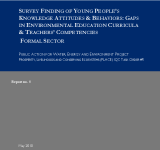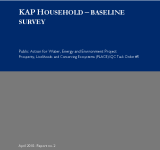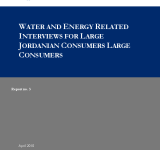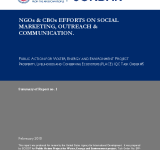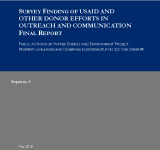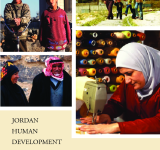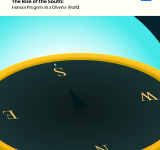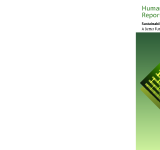The report aims to learn about young people's knowledge;; attitudes;; and behaviors with regards to water conservation;; energy conservation;; and waste management;; and it assess these against the learning objectives of the curriculum. It discovers that students' knowledge was sufficient and at times more sophisticated than that founded in the curriculum even though their attitudes and behaviors remain largely unchanged. The object of the survey pertains to the objectives of the Public Action for Water;; Energy;; and Environment Project;; which revolve around education for young people;; teachers and youth leaders to develop their knowledge and ethical values and attitudes. The survey focuses on assessing young people and educator's current awareness of water and energy resources and waste reduction and evaluating formal curriculum resources. The report points at the gap of translating young people's knowledge into genuine interest;; concern and action and proposes set of targeted actions including development of relevant resources and additional supplemental materials;; age-relevant projects to support environmental concepts in the national curriculum and assignment of environmental coordinator at all schools.
education
The report is based on the KAP household baseline survey;; which measures the current awareness of methods of water and energy conservations to determine how the Jordanians currently dispose of their household waste and how serious they believe the threat of global warming to be in Jordan. The household baseline survey on the use of water;; energy;; and the management of solid household waste has been designed based on the Knowledge;; Attitude and Practice (KAP) model;; and it aims to serve as a prelude to education and changing public behavior in the water and energy sectors in Jordan;; and to supply specific initiatives in the environment;; in particular in regard to the management of solid household waste. The research is based on a qualitative research;; a questionnaire and semi-structured interviews. The report concludes with the main findings that the most trusted sources of information on water conservation were the Ministry of Water and Irrigation;; and the Jordan Water Company. The survey finds that the respondents believe that the water shortage can be overcome with the water authorities' leadership including their engagement in grand projects.
The report aims to better understand and quantify the attitude and the levels of awareness amongst large consumers of water and energy;; and it presents the findings of the interviews conducted with a representative sample of large consumers to better understand trends and behaviors related to water and energy consumption. The research was conducted as part of the Jordan Public Action in Water;; Energy;; and Environment Project (PAP) under the Prosperity;; Livelihoods;; and Conserving Ecosystems (PLACE);; which aims to initiate and establish clear and identifiable behavioral changes amongst the Jordanian public and decision-makers. The study categorizes large consumers into a number of main sectors including hotel and restaurant sectors;; commercial sector;; hospitals;; government buildings and industrial sector;; and the field surveys were collected as a random sample of different industries;; state and commercial buildings. The research finds that the majority of large consumers neither monitor their water nor their energy consumptions via sub-metering scheme;; showing that the majority of large consumers are not able to accurately determine the areas within their establishments that are the most consuming. This finding identifies four major obstacles in implementing the water and energy saving practices including;; lack of awareness;; lack of incentive programs amongst employees;; higher prices for higher quality savings devices and lack of proper maintenance.
The report is based on the findings of the survey that was designed to review NGO/CBO experience in communication/outreach and assess the capability of individual staff in the relevant NGOS and CBOs. The primary goal of the project is to institutionalize social marketing practices in NGOs and CBOs;; because organizations in the forefront of development depend on their ability to reach target groups and remove barriers to change. The research was conducted as part of the Public Action in Water;; Energy;; and Environmental Project to initiate and establish clear and identifiable behavioral changes amongst the Jordanian public and decision-makers;; to lead to increased efficiency in the use of water and energy;; and to improve solid waste handling practices. The main findings of the research identify sources of funds and grants of the NGOs;; their major activities and partnerships. The report also suggests training for successful fundraising;; social marketing and media campaigns for the NGOs and continued surveys and interviews of the NGOs.
The report is based on the outreach and communication survey of USAID and other donors' efforts. It is part of the Public Action Project;; which supports USAID's technical and policy investments in the Jordanian water and energy sectors and specific initiatives in the environment. The survey was designed to report on past;; current and planned donor efforts in relation to water;; energy and solid waste management – with the main focus on water sector. It is intended to help the PAP team to design communication strategies and specific behavior change campaigns by building on lessons learned from outreach efforts. The report is based on the survey consisting of 39 open-ended interviews with donor officials and managers of donor-funded projects;; and it includes analysis and recommendations on coordination with current and planned donor projects. The report recommends improvement in coordination through development of national communication strategies;; assistance in water and energy sectors to establish trust and credibility with their customers;; reduction and streamlining of programs targeting schoolchildren;; and setting up of priority areas for change through technical assessment in water and energy.
This report consists of eight chapters and aims to summarise the key concepts of human development. It introduces the Human Development Index;; provides an overview of Jordan's human development achievements;; examines the regional vulnerability context that has constrained Jordan's options in its pursuit of social and economic development;; provides a platform for the poor to express their views and perceptions in relation to their poverty status;; reviews the policies;; institutions and processes that affect the poor;; examines the government's attempts to stimulate entrepreneurialism;; promotes the application of a rights-based approach;; in which all citizen are equally empowered and have the capacity and the appropriate enabling environment that allows them to claim their entitlements according to law. Finally;; the study examines the various reform initiatives in progress and assesses the extent to which Jordan is committed to the process.
The 21st century is witnessing a profound shift in global dynamics;; driven by the fast-rising new powers of the developing world. China has overtaken Japan as the world's second biggest economy;; lifting hundreds of millions of people out of poverty in the process. India is reshaping its future with new entrepreneurial creativity and social policy innovation. Brazil is raising its living standards by expanding international relationships and antipoverty programmes that are emulated worldwide. But the “Rise of the South” is a much larger phenomenon. Indonesia;; Mexico;; South Africa;; Thailand;; Turkey and other developing countries are becoming leading actors on the world stage. The 2013 Human Development Report identifies more than 40 developing countries that have done better than expected in human development in recent decades;; with their progress accelerating markedly over the past 10 years.
The 2011 Human Development Report argues that the urgent global challenges of sustainability and equity must be addressed together – and identifies policies on the national and global level that could spur mutually reinforcing progress towards these interlinked goals. Past Reports have shown that living standards in most countries have been rising - and converging - for several decades now. Yet the 2011 Report projects a disturbing reversal of those trends if environmental deterioration and social inequalities continue to intensify;; with the least developed countries diverging downwards from global patterns of progress by 2050. The Report shows further how the world's most disadvantaged people suffer the most from environmental degradation;; including in their immediate personal environment;; and disproportionately lack political power;; making it all the harder for the world community to reach agreement on needed global policy changes. The Report also outlines great potential for positive synergies in the quest for greater equality and sustainability;; especially at the national level. The Report further emphasizes the human right to a healthy environment;; the importance of integrating social equity into environmental policies;; and the critical importance of public participation and official accountability. The 2011 Report concludes with a call for bold new approaches to global development financing and environmental controls;; arguing that these measures are both essential and feasible.
